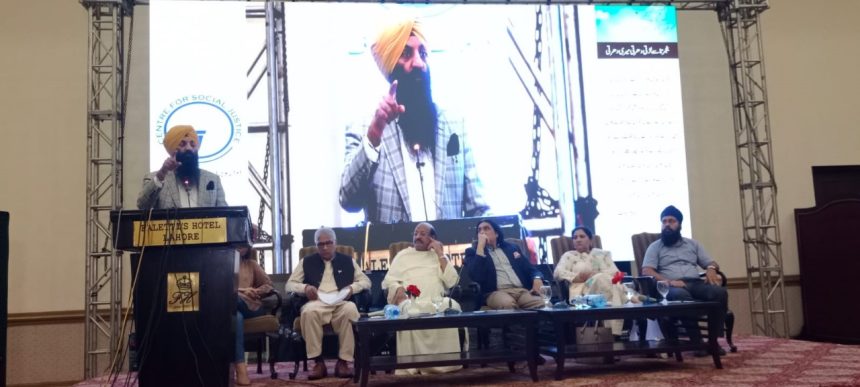The Centre for Social Justice (CSJ) on Thursday arranged its 8th annual convention in Lahore to mark the National Minorities’ Day, with focus on ways to tackle extremism.
The event, which was more of a call to action than just another gathering, brought together a diverse panel of speakers to discuss the growing threat of extremist ideologies that has plagued the Pakistani society over the years. Prominent among the speakers were CSJ Executive Director Peter Jacob, Ramesh Singh Arora, Barrister Aamir Hassan, Prof Dr Tahir Kamran, Dr Yaqoob Khan Bangash, James Channan, Nabila Feroze Bhatti, Suneel Malik, Tayyaba Rafiq, Kashif Baloch, Prashant Singh and Afshan Masab.
Peter Jacob opened the event with a warning about the rising tide of hatred, violence and extremism under the guise of religious fervor. He said the state needed to step in to prevent individuals or groups from playing the roles of judge, jury and executioner.
“We cannot allow mob justice to become the norm,” he said, adding that the only way to counter those dangerous ideologies was by promoting a narrative centered on equal rights, respect for diversity and citizenship. “The state must be neutral and treat all citizens equally, moving away from any preferential treatment that favors the majority,” he said, set the tone for a series of compelling speeches that followed.
Peter Jacob says mob justice could not be allowed, state must be neutral and treat all citizens equally
Ramesh Singh Arora, the provincial minister for minorities affairs, told the gathering that the Punjab Assembly would hold special proceedings on August 11 to mark the National Minorities Day. Acknowledging the challenges that minorities continue to face, he said the government was making all-out efforts to address all inequalities and protect the rights and dignity of all citizens irrespective of their religious background.
Barrister Aamir Hassan highlighted how extremism had transformed into terrorism, and recalled that the Pakistan People’s Party (PPP) had paid a heavy price for the sake of justice, peace and democracy. He proposed incorporating Quaid-e-Azam Muhammad Ali Jinnah’s August 11, 1947, speech – which focused on tolerance and equality for all citizens without any discrimination – into the preamble of the constitution. He urged citizens to reject extremist ideologies that seek to exclude others based on political, social or religious differences. He also called on policymakers to fully implement the National Action Plan, which he said was a comprehensive strategy designed to combat extremism.
Prof Dr Tahir Kamran talked about the dangerous consequences of labeling individuals as traitors or infidels based on their religious, ethnic or political identities. He pointed out that the shift from cultural and religious traditions, such as those embodied by Sufi shrines, to ‘rigid’ interpretations had contributed to the rise of extremism. He called for open debates and public discourse to foster a more inclusive and pluralistic society.
Addressing the gathering, Dr Yaqoob Khan Bangash said that state institutions must maintain their authority and prevent any group from imposing its will on others. He called for separating culture and religion from extremist ideologies. He said that education should be a tool for inclusion, not exclusion, so students belonging to minority communities should not be forced to study the majority religion in educational institutions.
James Channan’s speech was more of a plea for acceptance and tolerance. He spoke of his vision for a Pakistan where all citizens could live without fear, embracing a truly peaceful and tolerant society. He said that extremist ideologies could only be defeated when people were willing to accept and respect diverse views and beliefs.
Nabila Feroze Bhatti reinforced the importance of equality, urging the state to ensure that all citizens were treated fairly and with dignity. She reminded the audience that every human was born with inherent rights and dignity, and it was the state’s responsibility to protect those rights.
CSJ Deputy Director Suneel Malik closed the event with a call for ongoing dialogue and collaboration among academia, political parties, civil society and government bodies to effectively combat extremism. He also highlighted the importance of working together to build a more secure and inclusive future for all citizens.
The convention was a powerful display of unity and resolve, in which the participants reflected on Quaid-e-Azam’s vision of a progressive and tolerant nation. They called on the government to play a bigger role in promoting religious freedom, equality and non-discrimination.
The government’s past and ongoing efforts to combat extremism, especially the introduction of the National Action Plan in 2014, were also discussed on the occasion. The participants acknowledged the pledges made by political parties in their electoral manifestos to safeguard minority rights and prevent intolerance.
The convention welcomed the recent resolutions passed in the Senate, Punjab Assembly and National Assembly that condemned mob lynching incidents in Sargodha and Swat following blasphemy accusations, and called for government action to protect all citizens and prosecute those involved in those heinous crimes.












